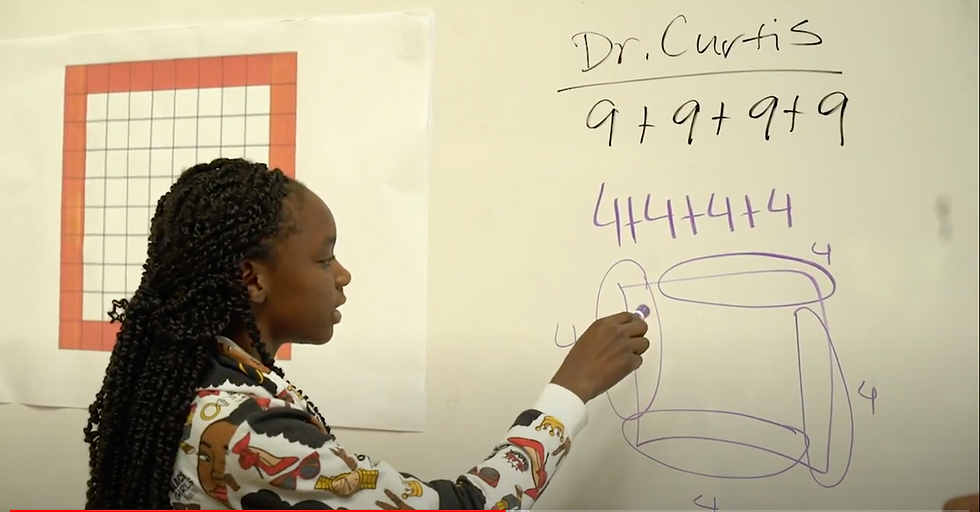The Problem of Practice
- Yay Math!
- Oct 17, 2018
- 3 min read
Part of being a learning community is being able to discuss topics that are controversial and uncomfortable. It seems that many of us are grappling with the question of “practice” in math. We want our students to have a deep conceptual understanding of important mathematical ideas, trust their own thinking and problem solving skills, and develop procedural fluency so they can use the tools of mathematics to explore the world around them. How can we do it all?
Here are a few thoughts on the topic….It’s not a question of IF students should practice in math class, the question is WHEN is practice useful? And WHAT counts as practice?
Let's discuss the When first.
When students are taught procedures without a conceptual understanding of why they should be using the procedure, they will often default to trying to memorize the procedure. Growing evidence about how the brain learns suggests this type of instruction is inefficient for developing a deep understanding of the discipline’s core concepts*. A key component to learning is how our brains compress complex concepts into usable frameworks that allow us to transfer skills from one context to another. Evidence from brain research suggests that while concepts can be compressed in the brain, procedures cannot**. When students are exposed to procedures without first grappling with why it might be useful in a particular context, they often default to trying to memorize it and fail to develop a deep conceptual understanding of the underlying mathematics. This results in shallow learning that is easily forgotten because the procedure is not anchored on a student’s pre-existing understanding of the need for the procedure. In fact, of the thirteen million students worldwide that participated in PISA tests, students who relied upon memorization strategies scored the lowest***.
If we tell a student how to solve a particular problem, it doesn't guarantee that the student has the internal conceptual schema necessary to integrate that information and use it in a new context. So when do students experience an authentic need for a procedure? Let's say we agree that it isn't necessarily what to tell students, but when to tell them – when is their grappling with the conceptual understanding sufficient to warrant a discussion about the most efficient way to solve a problem? If our goal is to be student centered, then the grappling with the question of why they need a particular procedure should come from students not from the teacher. Being told why by the teacher without the opportunity to grapple on their own is a lot less powerful than students coming to the realization on their own that a more efficient process would be helpful.
How to create those mathematical headaches is a whole other topic. At the moment we defer to Dan Meyer's great talk on this subject, and this list of mathematical headaches crowd sourced by math teachers everywhere.
The next issue is What counts as practice.
Let’s say you want your students to practice fluency in combining like terms.
Consider two possible options...
Option A: Kuta worksheet (Kuta is not sponsoring this newsletter)

Option B: Open Middle (also not a sponsor of this newsletter)

Consider, which of the two options allows students to practice mathematical creativity, problem solving, and critical thinking?
Which of the two options cannot be solved using photomath or Wolframalpha, or the student sitting next to them (and to counter this try using the accountability quiz strategy.)
Which of the two options allows for authentic collaboration and discussion?
Finally, which option honors the mathematical ideas that all students bring to the table and does not perpetuate status issues?
Some other folks' thoughts on practice
Jo Boaler’s thoughts on Practice (skip to 30:43 ) & fluency without fear.
Challenge of week
Read one of the linked articles with your colleagues and discuss.
Matome
We would love to know what you think. After perusing the ideas and resources on this blog what are your take-aways? What are your wonderings?
MAIC-ing It Happen!
We are excited to announce that we will be hosting our first Public Math Lesson Study event on November 7th at the Forum! Our very own Sarah Strong will be orchestrating the lesson (cue wild applause)! Her and a thoughtful team of math teachers have been meeting weekly to co-plan this event.
Why a Public Lesson Study Event?
Lesson study is an exhibition of student thinking and an exhibition of teacher learning at the same time. It aligns with what we care about most at HTH - making learning visible.
If we believe that this way of teaching math is good for students then why not celebrate it with our community?
We invite you all to join us on November 7th at Forum from 9am-3pm.

Yay Math!
*(Thurston, 1990; Gray & Tall, 2007)
**(Gray & Tall, 2007)
***(Boaler, 2015; OECD, 2014)



Comments